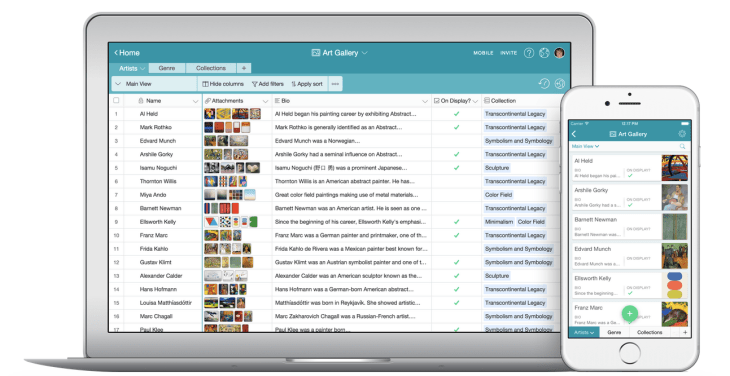A startup called Airtable wants to make data more accessible on mobile devices, by combining the ease-of-use of spreadsheets with the power of relational databases. It’s raised $3 million to pursue that goal and get its application more widely distributed.
Airtable was designed to take everything that we’ve come to take for granted about mobile apps — that is, ease, simplicity, access to information at our fingertips — and apply it to the complex world of databases. It is, in a sense, trying to provide a new way of interacting with information that was previously locked up in data centers and only accessible through proprietary applications.
Airtable give users access to information when and where they need it, by making it available both on the web and via mobile app. The app uses a sort of spreedsheet display of information, with a powerful relational database underneath.
As founder Howie Liu notes, spreadsheets were originally designed to do numerical tasks and financial analysis but are being used in all sorts of ways that they weren’t intended. That includes stuff like to-do lists, or making directories of employees or product inventory.
Those are the types of applications relational databases were designed for, but those databases are difficult to use. Airtable shifts that dynamic by giving users the ability to easily input records with information, create their own custom fields, and even add rich media like images and video into columns. Users can also change the way they view data based on what’s been input, and they can also link tables to associate related data.
While all this would be useful for individual users, the app was built for collaboration — meaning different team members can edit listings, and can even @mention each other within a specific notes field.
The app enables real-time editing and sync, so that changes are made on the fly and available to anyone accessing them. Accordingly, Airtable tracks all changes so that teams know what was edited when and by whom. Finally, tables have their own APIs, which means that they can be integrated into existing systems companies have built out.
So anyway — there’s a lot you can do with the application. So much so, in fact, that it’s easy to get lost in all the possibilities. To help users get over that hump, Airtable comes preloaded with a few suggested templates users can demo and possibly fill in with their own information.
That said, there will always be new ways for users to track info. In an email, Liu mentioned politicians’ offices using Airtable to manage campaign lists and filmmakers using it to track shots, scenes, actors and equipment.
Airtable raised $3 million in funding from investors that include Caffeinated Capital, Freestyle Capital, Data Collective, CrunchFund (which was founded by TechCrunch founder Michael Arrington), Box Group, Bebo founder Michael Birch, Box executive Villi Iltchev, Ben Ling, Snapup founder Shan Mehta, Farmville creator Amitt Mahajan, Ashton Kutcher, OpenDoor founder Eric Wu, YC partner Aaron Harris and Color Genomics co-founder Othman Laraki.
